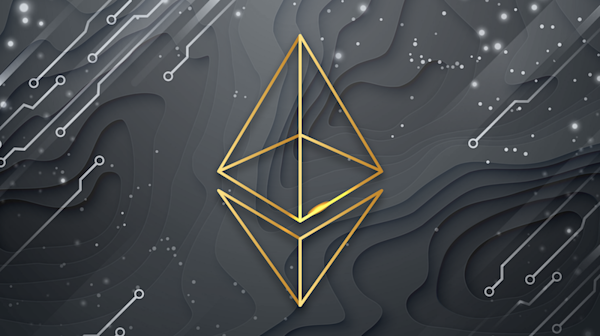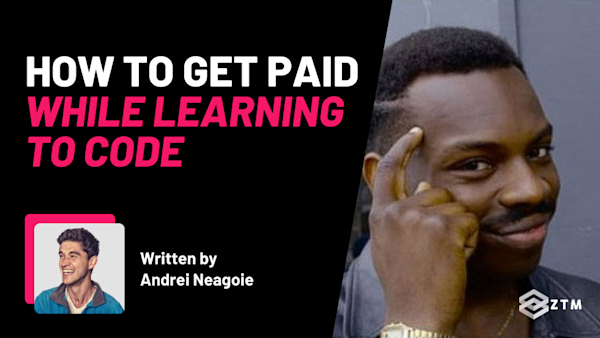Unless you’ve been living under a rock for the past few years, then you’ll know that Web3 and blockchain are being talked about as the future of the internet, Fintech, and more.
Heck, Web3 literally refers to the newest iteration of the internet or ‘Web 3.0’.
Why do we care?
Because being able to understand and work with the underlying blockchain technology that powers this change will reap huge rewards down the line, as well as being very lucrative even today.
We don't need to sell monkey pics to make money from this 🙉.
With that in mind, you’ve probably already been looking at a few Web3 focused languages to learn, and one of the forerunners that we recommend is Solidity, an object-oriented, high-level programming language, built for the Ethereum blockchain platform.

Solidity is the perfect next step for Developers with experience in either Python or Javascript, but it’s also relatively easy enough to learn (when following a set training program) that even beginners can pick it up with no prior experience.
Sounds good right?
Well, it gets better! In this article, we’re going to break down 7 reasons why you should learn Solidity asap if you want to get into working with blockchain technology or simply start earning more money with this high-demand language.
Reason #1. To finally understand those blockchain/crypto/NFT memes!
It’s not quite as bad as Marvel movie spoilers but it’s hard to work on the internet nowadays and not see some kind of crypto or blockchain meme on social media each week.
Even worse, these memes are incredibly niche with images of unicorns, ‘dogecoins’, and ape drawings and it can be hard to know what anyone is talking about.

There’s multiple meta-level memeing happening here!
And sure, we’re semi-joking when we say this is a benefit but learning Solidity will give you an understanding of blockchain, which is the core foundation of all Web3 technology.
This will help you to then move into multiple fields, but most importantly, it will help you finally understand all those blockchain memes and not just reply LOL to a gif in Discord with no idea what it means.

If that alone doesn’t convince you, well then here are a few more reasons 😀
Reason #2. Solidity is the best introduction to the world of blockchain
Blockchain has a few concepts that you might not have heard of before, and this can make it a little overwhelming to start working with or learning. Fortunately, though, Solidity makes for the perfect entry into this world.
The Solidity language itself is a high-level (similar to how people talk), so it’s not too complex and was specifically designed for working with blockchains.

How long does it take to learn Solidity?
If you already have a basic knowledge of Javascript and a set training program to follow and build projects, then you can learn Solidity in just a few months.
Obviously, the time frame differs per person and how long you dedicate to it, but the developer experience has improved a lot over the last few years, with more high-quality resources becoming available to learn blockchain and its associated languages.
All together, Solidity is by far the easiest entry into blockchain, allowing you to focus on learning concepts one by one without getting overwhelmed.
Reason #3. Learning Solidity will allow you to create Smart Contracts (A key component of blockchain)
Of course, the only direct reason to learn Solidity is so you can write smart contracts, but what exactly is a smart contract and why do we care?
What is a Smart Contract?
Smart contracts are programs on blockchains that are set to run when certain conditions are met, and follow simple logic statements of “if X occurs, then do Y”.

Smart Contracts can be used to automate workflows such as releasing funds or sending notifications etc.
And sure, that doesn't seem like anything groundbreaking at first until you understand how blockchain works and how smart contracts work within them.
I won’t go into all the details here as it’s a lot to cover, but there are 4 major benefits to smart contracts: They are immutable, fast, secure, and transparent.
Smart Contracts are fast
Smart contracts are automated and triggered as soon as the criteria are met, which means that they operate almost instantly.
Better still, they don’t require a 3rd party or intermediary which helps speed up any process that they are used for and even lowers costs.
Smart Contracts are secure
The blockchain is both decentralized and encrypted which means that Smart Contracts are incredibly difficult to hack into. Hackers would not only need to get past the encryption, but they would also need access to the connecting chains for the record that they wanted to hack, making it even more complex.
Smart Contracts are transparent and immutable
When a smart contract is executed, both parties are then immediately sent the transaction information meaning you can trust the event information hasn’t been altered.
Better still, the smart contract automatically updates the blockchain information without the need for other 3rd party interactions, meaning that no one can edit or manipulate this record, making it even more secure.
Reason #4. Solidity works with the Ethereum Virtual Machine, which is used everywhere! (Even with other independent and layer-2 chains)
So let’s break this down…
What is the EVM and why do we care?
The EVM or Ethereum Virtual Machine is the software platform developed by Ethereum, that allows Developers to create decentralized applications (DApps).

How is the EVM a benefit to learning Solidity?
There’s a whole heap of reasons that are a little complex, but the easiest and most obvious benefit is that the EVM is incredibly popular, with multiple projects being built on it every month.
And because Solidity is built for EVM, this means it’s a language with amazing current and future potential.
What like?...
Reason #5. Solidity is the main programming language for DeFi (Decentralized Finance)
Thanks to the speed and security of blockchain, decentralized finance or ‘DeFi’ is the biggest driver for decentralized applications today.
Good news?
Solidity powers most DeFi applications, meaning that there is a heap of job opportunities for Solidity Developers in this field.
In fact, the DeFi industry grew by 47% last year alone, valuing it at approximately $106 Billion USD!

Reason #6. Blockchain Developers are in high job demand + very well paid
Just being a Software Engineer already puts you in high demand, but Solidity Developers are even rarer.
In a recent article on the best programming languages to learn, we found that Solidity was the highest-paid language, starting at $112,000 and ramping up to $166,000 USD.

Not only is it highly paid, but because less than 0.5% of Developers know Solidity, there is a severe shortage of Solidity and blockchain Developers, meaning a lot of ongoing and emerging opportunities. (This shortage even caused some companies to stall while people trained and learned this language).
Even crazier, we saw reports that Solidity Developers with less than 6 months of experience are getting Senior roles due to the lack of competition!
Reason #7. Remote work!
In theory, you could work as a Software Developer from anywhere in the world. Beach, coffee shop, home office, etc.
Some companies however still prefer it if everyone works in the same office and for the same hours, but the curious thing about companies who are working on decentralized projects is they often adopt the same thinking to how they run their companies.
Decentralized, asynchronous work from any location and for high pay? Yes, please!

So what are you waiting for? Start learning Solidity today!
Hopefully, by now, you can see the value of learning Solidity and getting started with this Web3 future.
- It pays incredibly well
- It’s in high demand while also having a supply shortage of Developers who have learned it
- The industries that use this are all growing
- And if you learn Solidity now, you'll be able to become a Senior Developer way faster than if you focused on other programming languages
Not bad right?
The good news is that you can jump on our Solidity, Ethereum, and Blockchain Developer Bootcamp and start learning now.






